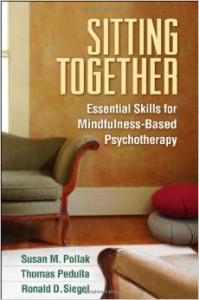How to incorporate mindfulness into psychotherapy
 Mindfulness is good for you. In thousands of studies, moment-to-moment, non-judgmental attention has been shown to improve well-being, strengthen relationships, increase focus and attention, and even boost our immune systems.
Mindfulness is good for you. In thousands of studies, moment-to-moment, non-judgmental attention has been shown to improve well-being, strengthen relationships, increase focus and attention, and even boost our immune systems.
So it’s no surprise that therapists have taken an interest in using mindfulness with their patients. The potential for benefit is clearly great. But how can therapists actually incorporate mindfulness into their practice? And, is it always helpful to patients?
To get answers to these questions, look no further than Sitting Together: Essential Skills for Mindfulness-Based Psychotherapy (February 2014; 240 pages). The authors—Harvard-based psychologists Susan Pollak and Ronald Siegel, and clinical social worker Thomas Pedulla—provide a wealth of research demonstrating the benefits of mindfulness for both therapists and patients, along with detailed guidance on when and how mindfulness practices might be useful in specific therapeutic situations.
There seems to be little controversy over therapists practicing mindfulness themselves, and the authors highly recommend doing so. In several studies, researchers found that therapists who practice mindfulness experience less burnout, more self-compassion, and a better connection with their patients, leading to more well-being for therapists. Additionally, some research shows that therapists who practice mindfulness are more highly rated by their patients.
Therapists can easily incorporate mindfulness into their days as clinicians, the authors write. They suggest taking a mindful eating break or using an unexpected “no-show” hour to eschew paperwork in favor of mindful meditation, which can help therapists decrease resentment and develop more self-compassion. Simple mindfulness practices like these can help therapists tap into their own joy and increase their tolerance for experiencing difficult emotions, benefitting themselves and their patients.
But therapists need to take more care when suggesting mindfulness practices for their patients, according to the authors. Mindfulness involves practicing three basic skill sets, each with different effects:
- Concentration, or focusing attention on a fixed object of awareness, which can help you understand the way your minds work;
- Open monitoring, or paying attention to whatever is passing through your consciousness, which can help you remain curious and open to whatever emerges in life; and
- Acceptance, which involves a developing a compassionate stance towards your experience and yourself. Though each skill is important to mindfulness, any one can potentially help or hinder a patient’s healing.
For example, patients who are very anxious and jittery may not be able to sit still and focus on their breath without increasing their anxiety; they might instead benefit more from walking meditation or focused attention on something outside themselves, such as sounds in their environment. A woman stuck in an abusive marriage may not benefit most from loving-kindness meditations, instead needing to connect with her anger through just talking about her situation and considering her options. Mindfulness practices don’t always augment therapy, but they can certainly help in many situations.
The authors guide therapists through the circumstances to consider before prescribing mindfulness practices for patients. For example, therapists should be experienced practitioners themselves and take into consideration the readiness of their patients to handle mindfulness experiences. They must understand how different mindfulness practices impact people—i.e. knowing whether the practice offers a sense of peace and safety, which some acceptance practices do, or whether it intensifies awareness of thoughts and emotions, which concentration or open awareness practices might do.
These and other issues, such as the strength of the therapeutic relationship, should be considered before implementing mindfulness with patients, they warn.
Patients may not be open to the idea of mindfulness because of religious or other reasons. In this case, the authors suggest that therapists introduce mindfulness as a scientifically-proven stress reliever, rather than a secular version of a Buddhist practice. Therapists can also provide graduated experiences for patients, using time in the therapy session to make sure patients feel comfortable with the practices and that concerns are addressed.
The authors have both a firm grasp on mindfulness and important insight into the therapeutic process. Their book is full of clinical examples as well as detailed directions on how to use mindfulness in different therapeutic situations with different kinds of patients. If you are a therapist interested in incorporating mindfulness into your own life or into the work you do with patients, I highly recommend this thorough, thoughtful book.
 – Jill Suttie, Psy.D., is Greater Good‘s book review editor and a frequent contributor to the magazine. Greater Good is an online magazine based at UC-Berkeley that highlights ground breaking scientific research into the roots of compassion and altruism.
– Jill Suttie, Psy.D., is Greater Good‘s book review editor and a frequent contributor to the magazine. Greater Good is an online magazine based at UC-Berkeley that highlights ground breaking scientific research into the roots of compassion and altruism.
Read more:


